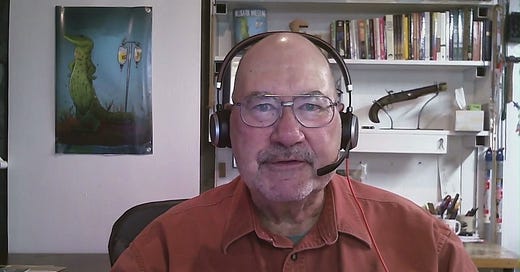“And I said to them, ‘Look! When I came in here last night I TOLD you to change the dressing! And you didn’t do it! Now just LOOK at this mess!’” Her tone was shrill, filled with venom, as she recounted her disastrous experience in a previous hospital.
“And they finally changed the bandages, but only because I MADE them,” Matilda went on, her voice drenched with contempt. “But it was pretty clear they didn’t WANT to! Those people were TERRIBLE!”
I opened my mouth to offer some words to deflect the hostility, but she leaped into her own silent space after taking a breath. “And this place is about as bad! They don’t tell me ANYTHING! I can’t get a straight answer from the doctors! I got so many of them I can’t keep ‘em straight, but none of them will tell me what’s going on!” She sniffed and scowled at the clipboard on which she continued to scratch doodle-marks with a colored pencil. “I think they’re trying to avoid me!”
I could not avoid the sarcasm in my head: Really? Why on earth would they try to avoid YOU?
Just trying to help…
I had entered her room for a routine patient contact in my customary twice-a-month visits to the cancer unit. I had once spent 3 months in a room like this one. My own private war with millions of mutinous while blood cells had been bloody and crippling, yet here I was still. Reaching out to others similarly afflicted is a tiny effort to let a little light into their dark spaces.
Because I’ve been there.
On this visit, the illumination I wanted to offer — if I could ever get a word in — was snuffed out against a wall of bitterness.
Matilda’s cancer had created a huge, unsightly tumor on her thigh. I am neither medical professional nor trained counselor. All I really do well is happy talk. I stood on the far side of her bed, where the repulsive growth was out of my line of sight, and listened with growing impatience to the vitriol.
“And the FOOD here…” She resumed her unending stream-of-consciousness diatribe, accompanied by the obnoxious blare of the television. She seemed unaware she had left the volume up. Don’t wanna miss a single line of this pointless soap opera.
The colored pencil continued to scratch away, impervious to her own complaints, the TV, and the visitor standing quietly at bedside.
Put away your bitterness, wrath, anger and evil speaking, wrote the Apostle. Good advice, but it only works for the one who is self-reflective enough to act on it.
Someone else’s fault
Psychologists have observed that unchecked bitterness amplifies a person’s negative emotional state. It invariably leads to chronic stress and depression. Somehow, these also leads to problems with blood pressure, heart disease and reduced immune function.
One thing a cancer patient does NOT need is something else to reduce the immune function.
In Matilda’s case, I strongly suspect there was some guilt at work. The verbal assault on those who were her only hope for healing was, I suspect, a mask for her own self-reproach. Her obvious obesity and her admitted financial distress both had their roots in her own past behavior.
We all have things we’re not proud of, and blaming someone else for our own failures — what the researchers call “projection” — is a favorite tactic.
Matilda had raised it to an art form.
There is a better way
Maybe 50 years ago I attended a week-long Christian seminar called the Institute in Basic Life Principles, by a Bible teacher named Bill Gothard. There was an overwhelming amount of material delivered quickly: Drinking from a fire hose. Some of his convictions got little traction then and would get less today, such as his rejection of popular Christian praise music. On balance, however, his perspectives on human relationships were straight-forward, Biblical and practical.
Gothard’s teaching was the first time I had been exposed to the technical distinction between what the Bible calls “soul” and “spirit.” (I had no idea then that these terms can easily be accessed in something like Vine’s Expository Dictionary of New Testament Words, or Strong’s Concordance. And yes, today there are apps for both.)
“Soul,” as Gothard explained it, is composed of a person’s mind, will and emotions. The soul is therefore the seat of what we think, what we intend, and how we feel. It encompasses most of what makes me, me.
“Spirit” is the part of me that communes with God — or seeks to do so. It is where spiritual life and spiritual discernment reside.
In that line of thought, the distinction is this: The soul is focused on my earthly existence and relationships, while the spirit is concerned with my relationship with God. They are of course deeply intertwined.
Ideally, the spirit guides the soul into a lifestyle that honors God and aligns with His will. And thus, makes my life easier and more harmonious. It’s always easier if you don’t argue with your Creator.
Who’s in charge here, anyway?
I have concluded this: When I allow guilt and self-recrimination to dominate my thoughts, and I plan to proclaim that my problems are someone else’s fault, I will most certainly sink into depression and bitterness. Mind, will and emotion: A devilish triad left to run amok. Psychological health is certainly damaged, and physical health inevitably follows that downward trajectory.
I once read a realistic novel of a World War II submarine that, after a successful raid against Japanese shipping, had been struck by enemy fire on the surface. The captain had been killed. The first officer took over as his new command slowly spiraled down toward crush depth.
Repair after repair, tactic after tactic, desperate measure after desperate measure were attempted in efforts to bring the stricken craft to the surface, but all to no avail. Eventually it became obvious there would be no escape. At some point, the enormous weight of the unforgiving sea would implode the hull. And that is how the story went.
What a depressing end to such a promising beginning.
Standing in Matilda’s room, I could not avoid the comparison.
Search the soul, find the peace
Finally, I interrupted her continuous, acrimonious flow of words: “I have to go to my next appointment, Matilda. I sincerely hope you get better.”
She suddenly paused, made eye contact with me, and — incongruously — smiled. “Have a nice day!” she said cheerfully.
“Yes, you do the same,” I mumbled, and found my way out. Sheesh.
Okay… I already said I’m not a trained counselor.
As Commander Riker once said to Captain Picard, after Enterprise was forced to back down from a Romulan confrontation in the Neutral Zone: “Some days you get the bear, and some days the bear gets you.”
Overcoming bitterness requires a brutal self-assessment of my own thoughts, plans and emotions — in other words, soul searching. We would do well to remember the direct and uncompromising words of Jesus:
Fear not the one who destroys the body but cannot destroy the soul;
but rather fear Him Who is able to kill both soul and body in Hell.
Matthew 10:28
Cancer can only kill the body; it has no power over the soul unless we bow down to it.
We CAN search our souls. We CAN change the way we think about our circumstances. We CAN choose to guide our words into ways that serve others. The mind is the engine that drives both the will and the emotions.
Perhaps the best way to avoid focusing on our own challenges is to focus on helping someone else overcome theirs.
Thanks for following The Alligator Blog. I am always humbled to see how many of you actually open this up and read it. (Or at least, you open it up.) Please share it with someone else.
P.S.: Time seems to accelerate with each passing month. The future rushes toward us and does not appear to care that we may not be ready for it. To make the most of the next phase of your life, I would invite you to join others at Your Best Retirement, our sister newsletter. Each week there is red meat: A tip, tactic or technique to maximize our relevance in the time granted to us on this earth — whether we ever retire or not. The subscription is free; like The Alligator Blog, it will show up in your inbox.
Click the link below to subscribe.
















Share this post